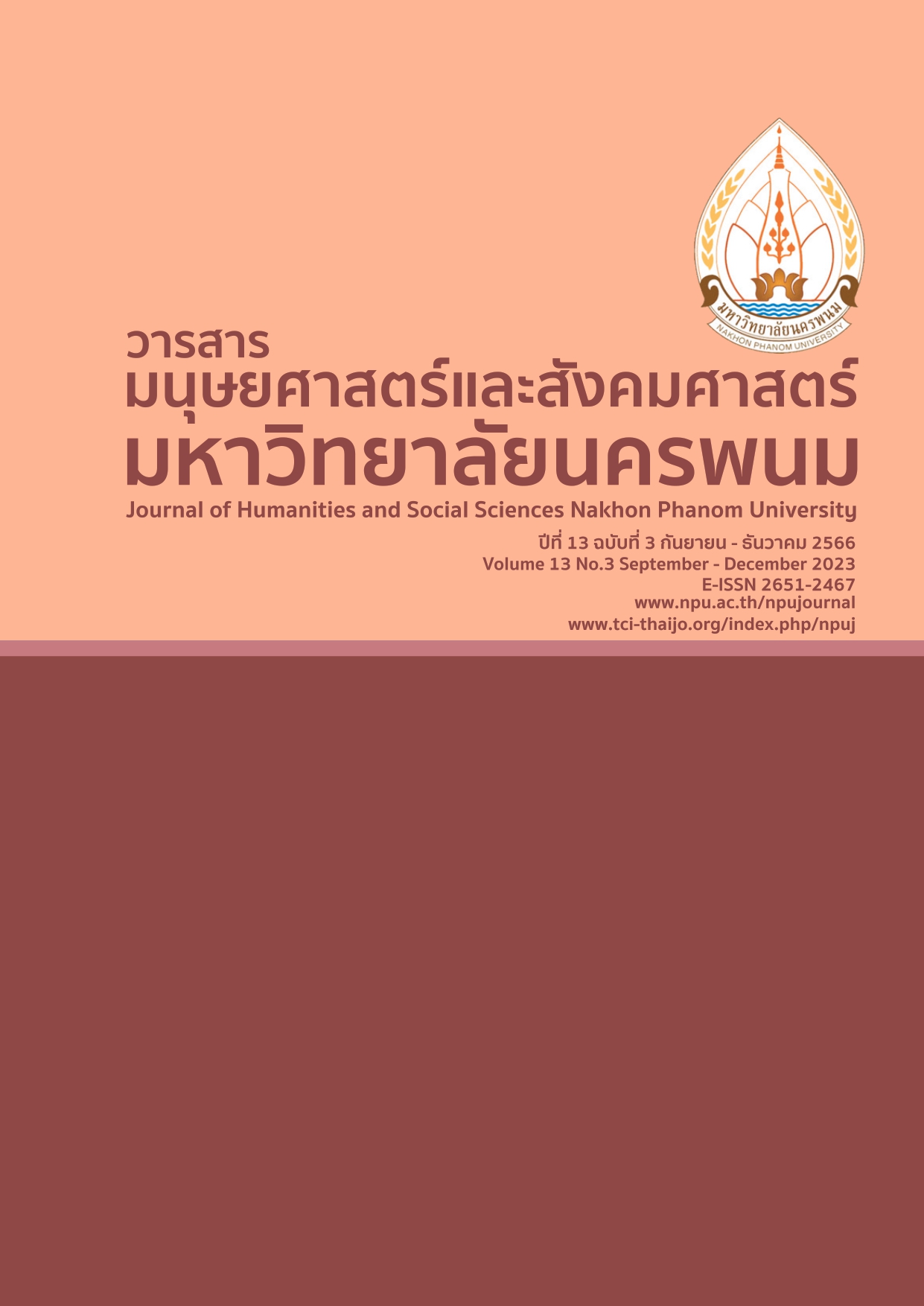The Development of Local Curriculum : Music and Ancient Remains in Lopburi : A Case of The Sacred Performance for Relics Worship
Main Article Content
Abstract
The objectives of the research were to study basic data on curriculum development, to experiment a local curriculum, to evaluate and improve the curriculum in terms of the learning outcomes and the potential in conducting relevant creative coursework projects, and to study the attitudes of 29 undergraduate freshmen students in Music Education major in the first semester of academic year 2023 towards the curriculum. The instruments used in this research were the local curriculum, the questionnaire, the group interview topics, the learning achievement test, the potential assessment form on creative coursework projects, and a questionnaire on students’ attitudes towards the curriculum. The data were analyzed using percentage, mean, standard deviation, and dependent sample t-test. The findings were as followed: 1) The result of the basic data study showed that the students and the involved people required the curriculum focusing on collaborations from educational institutes, organizations, and communities to create the local identity of Lopburi, and the local experts were required to take part in learning management. 2) The result of developing the curriculum found that the components of the current curriculum consisted of principles, objectives, structures, course descriptions, scopes of course content, learning periods, teaching guidelines, medias, evaluations, and 5 learning modules. The result of the experts evaluating found that the curriculum components were relevant and suitable for teaching. 3) The result of the curriculum experiment with students using the leaning activities such as group activities, action learning activities, using learning resources for cultural heritage and ancient sites in Lopburi, learning from the officials of the 4th Regional Office of Fine Arts Department and the local community scholars who were the lecturers with the researchers. 4) The result of the curriculum evaluation and improvement indicated that there was a significant difference at .05 level in learning about the contents in the developed curriculum. The students were able to conduct relevant creative coursework projects and also expressed positive attitudes. Both instructors and students suggested that the curriculum should be improved in terms of learning time periods to be flexible and suitable to the contents.
Article Details

This work is licensed under a Creative Commons Attribution-NonCommercial-NoDerivatives 4.0 International License.
References
Cronbach. (1970). The evolution of research. New York : Harper Collins.
Dakliang, A. (2022). Kānphatthanā laksūt rư̄ang ʻāhān thin Thai won tambon nam ʻāng čhangwat ʻUttaradit samrap nakrīan chan prathom sưksā pī thī hok [Curriculum Development on Local Tai Yuan Food in Nam Ang Subdistrict, Uttaradit Province for Prathomsuksa 6 Students] (Master’s thesis). Uttaradit Rajabhat University, Uttaradit, Thailand.
Dechakhup, P. (2023). Kanrīanrūchoēngruksoēmsāngsamatthana [Active learning enhances competency]. Bangkok : Chulalongkorn Publishing House.
Menakanit, A. (2008). Sēwanāsančhō̜nThō̜ʻongprawatsāt+Sinlapahǣngphamāprathed [Traveling discussion on history+Art of Burmese country]. Bangkok : Hong Interprint.
Meyers, C., and Jones, T. B. (1993). Promoting Active Learning : Strategies for the College Classroom. San Francisco : Jossey-Bass.
Nakwijit, R. (2020). Kānphatthanā laksūt thī nēn kānʻō̜kbǣp kānrīanrū tām nǣo satī mō̜ sưksā bon thān phūmpanyā thō̜ngthin samrap naksưksā khrū [Curriculum Development Emphasizing with Learning Design as STEAM Education Based on Local Wisdom for Student Teachers] (Doctoral dissertation). Srinakharinwirot University, Bangkok, Thailand.
Phatphon, M., et al. (2019). Kān wičhai læ phatthanā phư̄a kān phatthanā laksūt læ kān rīanrū [Research and development for curriculum and learning development]. Bangkok : Sunphunam nawattakam Phathiyathanee, S. (2008). Kānwatphonkānsưksā ิphimkhrangthīHok) [Educational measurement 6th printing]. Bangkok : Prasan kanphim.
Rattanapaisalkit, R. (2021). Kānphatthanālaksūtnawatsin čhākthunthāngwatthanathornromlānnā samrapyaowachon Dōichaikānkidchœ̄ngʻō̜kbǣp [Developing an innovative arts curriculumFrom Lanna cultural capital for youth using design thinking] (Master’s Thesis). Chulalongkorn University, Bangkok, Thailand.
Rattanaubon, A. (2019). Nǣokhit kān songsœ̄m kānsưksā talō̜t chīwit nai sangkhom Thai [Concept of promoting lifelong education in Thai society. Bangkok : Printing house of Chulalongkorn University.
Srisa-art, B. (2010). Kanwichai bưangton [Preliminary Research]. Bangkok : Phiriyasan.
Taba, H. (1962). Curriculum Development: Theory and Practice. New York : Harcourt, Brace and World, Inc.
Yonsuriyan, N. (2020). Phon kānčhatkān rīanrū bǣp khrōng ngān pen thān rō̜wō̜ makap nǣokhit bǣp STEM EDUCATION phư̄a songsœ̄m khwāmpen tok ra læ phon ngān sāngsan khō̜ng nak rīan chan prathom sưksā pī thī hā [Results of project-based learning combined with STEM EDUCATION concepts to promote the creativity and creativity of 5th grade students] (Master’s Thesis). Silpakorn University, Nakhon Pathom, Thailand


